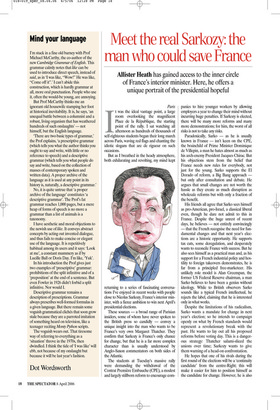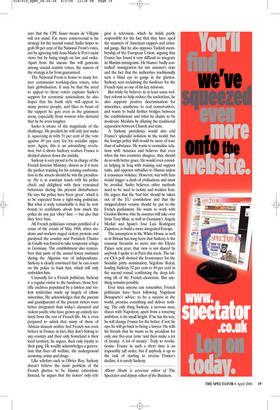Meet the real Sarkozy: the man who could save France
Allister Heath has gained access to the inner circle of France’s interior minister. Here, he offers a unique portrait of the presidential hopeful
Paris
It was the ideal vantage point, a large room overlooking the magnificent Place de la République, the starting point of the rally. I sat watching all afternoon as hundreds of thousands of self-righteous students began their long march across Paris, waving red flags and chanting the idiotic slogans that are de rigueur on such occasions.
But as I breathed in the heady atmosphere, both exhilarating and revolting, my mind kept returning to a series of fascinating conversations I’ve enjoyed in recent weeks with people close to Nicolas Sarkozy, France’s interior minister, with a fierce ambition to win next April’s presidential elections.
These sources — a broad range of Parisian insiders, some of whom have never spoken to the British press so candidly — convey a unique insight into the man who wants to be France’s very own Margaret Thatcher. They confirm that Sarkozy is France’s only chance for change, but that he is a far more complex character than is usually understood by Anglo–Saxon commentators on both sides of the Atlantic.
The students at Tuesday’s massive rally were demanding the withdrawal of the Contrat Première Embauche (CPE), a modest and largely stillborn reform to encourage com panies to hire younger workers by allowing employers a year to change their mind without incurring huge penalties. If Sarkozy is elected, there will be many more reforms and many more demonstrations; for him, the worst of all risks is not to take any risks.
Paradoxically, Sarko — as he is usually known in France — isn’t keen on the CPE, the brainchild of Prime Minister Dominique de Villepin, a man he hates almost as much as his arch-enemy President Jacques Chirac. But his objections stem from the belief that France needs new rules for everybody, not just for the young. Sarko supports the El Dorado of reform, a Big Bang approach but only after consultation and debate. He argues that small changes are not worth the hassle as they create as much disruption as wholesale reforms but with only a fraction of the benefit.
His friends all agree that Sarko sees himself as pro-American, pro-Israel, a classical liberal even, though he dare not admit to this in France. Despite the huge unrest of recent days, he believes — not entirely convincingly — that the French recognise the need for fundamental changes and that next year’s elections are a historic opportunity. He supports tax cuts, some deregulation, and desperately wants to reconcile France with success. But he also sees himself as a practical man and, as his support for a French industrial policy and hostility to foreign takeovers demonstrates, he is far from a principled free-marketeer. His unlikely role model is Alan Greenspan, the former US Federal Reserve chairman, a man Sarko believes to have been a genius without ideology. While to British observers Sarko sounds like a typical French intellectual, he rejects the label, claiming that he is interested only in what works.
Despite the limitations of his radicalism, Sarko wants a mandate for change in next year’s election; so he intends to campaign openly on what by French standards would represent a revolutionary break with the past. He wants to lay out all his proposed reforms before voting day. This is a dangerous strategy: Thatcher salami-sliced the unions over time; Sarkozy wants to give them warning of a head-on confrontation.
He hopes that one of his rivals during the first round of the elections will be a ‘continuity candidate’ from the centre-Right; this will make it easier for him to position himself as the candidate for change. However, he is also sure that the CPE fiasco means de Villepin will not stand. Far more controversial is his strategy for the second round. Sarko hopes to grab 80 per cent of the National Front’s votes, not by agreeing with Jean-Marie le Pen’s racist views but by being tough on law and order. Apart from the unease this will generate among crucial centrist voters, the success of the strategy is far from guaranteed.
The National Front is home to many former communist working-class voters, who hate globalisation. It may be that the need to appeal to these voters explains Sarko’s support for economic nationalism; he also hopes that his frank style will appeal to many poorer people, and likes to boast of the support he gets even in the grimmest areas, especially from women who demand that he be even tougher.
Sarko is aware of the magnitude of the challenge. He predicts he will only just make it, squeezing in with 51 per cent of the vote against 49 per cent for his socialist opponent. Again, this is an astonishing revelation, but it shows Sarkozy realises France is divided almost down the middle.
Sarkozy is very proud to be in charge of the French Interior Ministry, almost as if it were the perfect training for his coming confrontation in the streets should he win the presidency. He is in constant touch with his police chiefs and delighted with their restrained behaviour during the present disturbances. He says the police have been ‘great’, which is to be expected from a right-wing politician. But what is truly remarkable is that he now boasts to confidants about how much the police do not just ‘obey’ him — but also that they ‘love’ him.
All French politicians remain petrified of a rerun of the events of May 1968, when students and workers staged violent protests and paralysed the country and President Charles de Gaulle was forced to take temporary refuge in Germany. The establishment also remembers that parts of the armed forces mutinied during the Algerian war of independence. Sarkozy is clearly convinced that he can count on the police to back him, which will only embolden him.
Unusually for a French politician, Sarkozy is a regular visitor to the banlieues, those horrific enclaves populated by a lawless and violent underclass made up largely of ethnic minorities. He acknowledges that the parents and grandparents of the present rioters were better integrated than today’s alienated and violent youth, who have grown up entirely isolated from the rest of French life. He is even prepared to admit that many of those of African descent neither feel French nor even believe in France; in fact, they don’t belong to any country and their only homeland is their local territory, he argues, their only loyalty to their gang. He readily acknowledges a generation that lives off welfare, the underground economy, crime and drugs.
Like scholars such as Olivier Roy, Sarkozy doesn’t believe the main problem of the French ghettos to be Islamic extremism. Instead, he argues that the rioters’ only reli gion is television, which he holds partly responsible for the fact that they have aped the manners of American rappers and criminal gangs. But he also opposes Turkish membership of the European Union, arguing that France has found it very difficult to integrate its Muslim immigrants. He blames ‘badly controlled’ immigration for last autumn’s riots and the fact that the authorities traditionally turn a blind eye to gangs in the ghettos. Sarkozy sees reclaiming the banlieues for the French state as one of his key missions.
But while he believes in at least some welfare reform to help reduce the underclass, he also supports positive discrimination for minorities, anathema to real conservatives, and wants to build further bridges between the establishment and what he claims to be moderate Muslims by diluting the traditional separation between Church and state.
A Sarkozy presidency would also end France’s splendid isolation in the world; but the foreign policy shift would be more of tone than of substance. He wants to normalise relations with America and believes that even when the two countries disagree, they should do so with better grace. He would even consider helping in Iraq with training and support tasks, and opposes subsidies to Hamas unless it renounces violence. However, war with Iran would trigger a clash of civilisations and must be avoided, Sarko believes; other methods need to be used to isolate and weaken Iran. He argues that the ‘bad bits’ should be taken out of the EU constitution and that the stripped-down version should be put to the French parliament. He wants to work with Gordon Brown, who he assumes will take over from Tony Blair, as well as Germany’s Angela Merkel and Spain’s José Luis Rodriguez Zapatero, to build a more integrated Europe.
The assumption in the White House as well as in Britain has long been that Sarkozy is the runaway favourite to move into the Elysée Palace next year; that view is not shared by anybody I spoke to in Paris this week. The latest CSA poll showed the frontrunner for the Socialist party nomination, Ségolène Royal, leading Sarkozy 52 per cent to 48 per cent in the second round, confirming the deep leftwing tilt of the French electorate. But anything remains possible.
Ever since anyone can remember, French politicians have been following Napoleon Bonaparte’s advice: to be a success in the world, promise everything and deliver nothing. The only thing Sarkozy, a nervous man, shares with Napoleon, apart from a towering ambition, is his small height. If he has his way, he will change France for the better; if not, he says he will go back to being a lawyer. He tells his friends that he wants to be president for only one five-year term ‘and then make a lot of money. A lot of money’. Truly to revolutionise France in such a short time is an impossibly tall order; but if anybody is up to the task of starting to reverse France’s decline, it is surely Sarkozy.
Allister Heath is associate editor of The Spectator and deputy editor of the Business.











































































 Previous page
Previous page